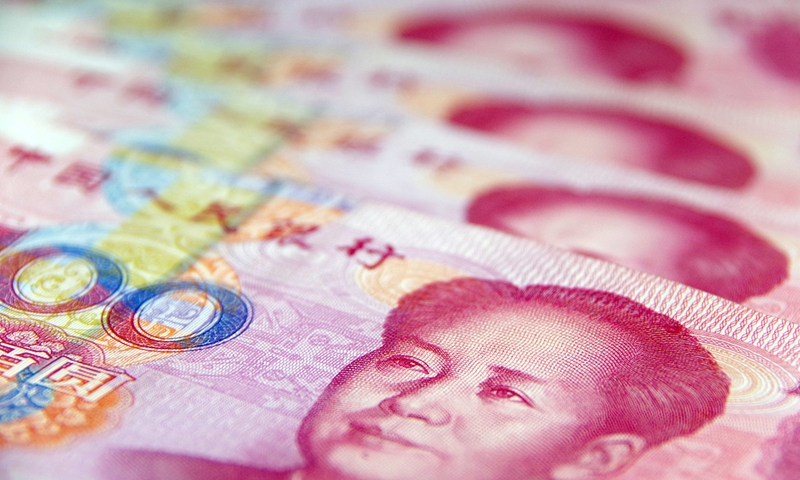
RMB Photo:VCG
More countries are poised to pivot to the yuan, arguably the most preferred non-Western currency for the developing world, Chinese experts said on Wednesday, amid a global push toward de-dollarization that began in 2021.
The yuan's relatively stable exchange rate and market anticipation of gradual appreciation has ensured its popularity among many developing countries, especially after the Russia-Ukraine conflict began in February.
The latest example of the yuan's growing foothold abroad is the issuance of 4 billion yuan ($590 million) worth of yuan-denominated bonds in the Russian market by Rusal, a Russian aluminum company, with the issuance completed on Wednesday.
Analysts at underwriter Gazprombank predicted that more Russian companies will follow suit, and the yuan will be increasingly popular in Russia due to US-led Western sanctions.
Prior to the Rusal deal, Indian cement producer Ultratech reportedly purchased coal from Russian coal trader major SUEK in a deal worth 172 million yuan.
Chinese analysts said rising geopolitical tensions and the West's seizure of Russian assets have taught many countries a lesson. Due to the yuan's unique status as the most preferred non-Western currency for developing nations, the use of the yuan in terms of reserves and settlements is expanding since the second half of 2021.
Zhou Yu, director of the Research Center of International Finance at the Shanghai Academy of Social Sciences, said that after Western countries lost investors' trust in their handling of Russian assets amid the conflict, more countries diversified away from dollar assets and the yuan became their currency of choice.
Diversifying into the yuan met with their economic interests, Zhou said, pointing to the yuan's relatively resilient exchange rate with the world's major economies.
In Russia, the yuan's share increased from 0.1 percent in 2017 to 17.1 percent in 2021, public data showed.
Wang Peng, a research fellow at the Beijing Academy of Social Sciences, said that the Rusal case is just a new example of the vast potential of the yuan's internationalization.
"Seen from a long-term perspective, there are still many scenarios for yuan settlements, and more countries are likely to adopt the currency out of concerns for convenience, security and efficiency," Wang said, noting that this would especially be true for countries more closely related to China's supply chains.
It also meets the requirements of relevant countries' needs for diversification, risk control and stability.
Russian experts said both China and Russia stand to gain if the yuan becomes the major settlement currency of the BRICS countries.
The National Bank of Belarus, the central bank of Belarus, has expanded the list of foreign currencies included in the basket that is used for setting the exchange rate, adding the yuan with a weight of 10 percent starting from July 15.
In March, The Wall Street Journal reported that Saudi Arabia was considering accepting yuan instead of US dollars for oil sales.
Global mining giant BHP, based in Melbourne, officially started yuan-based spot iron ore trades at Chinese ports on July 10.
But Zhou said the yuan's internationalization will still be a gradual process and there is no way that the yuan's share will increase too fast.
It took the dollar decades to topple the British pound, even after the US economy outstripped that of the UK.
The yuan's share of global reserves was 2.9 percent as of end March, up from 2.8 percent in the fourth quarter and 2.5 percent a year ago, IMF data showed.




